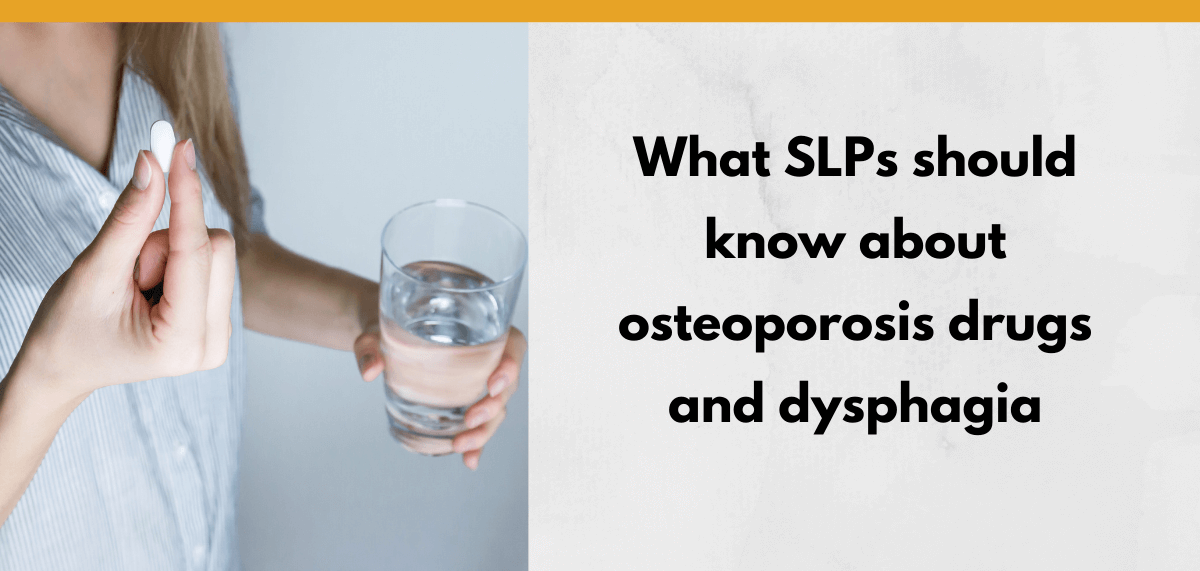Some commonly used osteoporosis drugs can cause or worsen dysphagia in our patients. In addition, our patients who have dysphagia can have increased risk of harm from taking osteoporosis drugs. I’ve teamed up with C. Michael White, Pharm.D., FCP, FCCP from the UConn School of Pharmacy to explore the relationship between swallowing problems and these oral bisphosphonate drugs.
Free DIRECT download: Osteoporosis and dysphagia (cheat sheet). (Email subscribers get free access to all the resources in the Free Subscription Library.)
Outline:
- What are oral bisphosphonates?
- Who takes these osteoporosis drugs?
- How can osteoporosis drugs cause or worsen dysphagia?
- How can dysphagia increase the risk of harm from osteoporosis drugs?
- Do medication lubricants or coatings help?
- What can the SLP do?
- What if our patient can’t swallow whole pills with thin water?
- References.
- Related Eat, Speak, & Think posts.
What are oral bisphosphonates?
Bisphosphonates are effective drugs for slowing the severity of osteoporosis, a major issue among our older patients. These are the FDA-approved oral options:
- Fosamax (alendronate)
- Actonel (risedronate)
- Boniva (ibandronate)
- Atelvia (risedronate delayed release)
- Didronel (etidronate)
- Skelid (tiludronate)
Who takes these osteoporosis drugs?
Because women, on average, develop less total bone mass than men, our older female patients are more likely to be taking bisphosphonate drugs than our male patients. They generally start taking the medication in their late 60s.
People with Paget’s disease are also more prone to bone loss and may take these medications as well.
Therapy is lifelong once it’s started, and a patient needs to take 80% or more of their prescribed osteoporosis drugs to have optimal effect.
How can osteoporosis drugs cause or worsen dysphagia?
Oral bisphosphonates can cause medication-induced gastrointestinal injury. The exposure of the inner lining of the esophagus to these medications can lead to irritation, ulceration, and stricture which can cause discomfort and impede the passage of food or liquid through the esophagus.
Patients with esophageal irritation and damage may be referred to us for a swallowing assessment without physician review of medications that may be contributing or causing the problem.
Here are some of the symptoms our patients may complain about (see also this PDF):
- Food getting “stuck” in the throat or upper chest.
- Coughing up food or pills after swallowing.
- Needing to drink liquids to help the food go down.
- Complaints of difficulty swallowing without overt clinical signs of oropharyngeal dysphagia.
- Painful swallowing.
- Heartburn, chronic cough, chronic throat clearing, chronic sore throat.
- Excessive secretions/saliva, acidic taste, regurgitation, sinus problems.
- Nausea, upset stomach, or upper abdominal pain or discomfort.
How can dysphagia increase the risk of harm from osteoporosis drugs?
Our patients who have dysphagia have increased risk of harm from taking oral bisphosphonate drugs.
Patients with esophageal dysphagia will experience prolonged exposure of the drug to the lining of the esophagus, as it takes longer for the material to pass into the stomach. Thus, esophageal dysphagia increases the risk that the medication will cause esophageal irritation or damage, which could in turn worsen the symptoms associated with eating and drinking.
Our patients who have oropharyngeal dysphagia may inadvertently aspirate the pill into the airway, where it can play havoc with the delicate tissues of the respiratory system. Not only would the patient be denied the beneficial impact of the medication, but they may also experience the onset of other symptoms.
Do medication lubricants or coatings help?
Medication lubricants and coatings can make pills easier to swallow and thus may decrease risk of aspiration into the lungs, but the impact of the coating on the stability of oral bisphosphonates has not been investigated and could partially inactive them.
This means that while over-the-counter pill swallowing aids may improve a patient’s ability to safely swallow the osteoporosis drug, it wouldn’t reduce the risk of esophageal injury and the effectiveness of the medication may be reduced.
I (Lisa) asked Dr. White about Phazix specifically, since its website claims that its pill lubricant doesn’t interact with medications. He advises against using any medication lubricants or coatings for two reasons. First, they haven’t been tested with oral bisphosphonate drugs. And second, the package insert states that only regular water should be used, not even mineral water or flavored water.
What can the SLP do?
During our chart review, we should be alert for any of the oral bisphosphonate drugs listed above.
If our patient is taking any of these medications, we should confirm whether our patient is following the administration guidelines.
Oral bisphosphonate drugs should be taken in the following manner:
- Taken first thing in the morning, on an empty stomach with 8 ounces of plain, thin water. (Atelvia should be taken immediately following breakfast.)
- Remain upright and do not eat or drink anything for at least 30 – 60 minutes. This allows the drug to move through the esophagus as quickly as possible.
- Patients with esophageal dysmotility may need to remain upright longer.
Learning that our patient is not following these recommendations raises a red flag for possible current or future esophageal issues. We can educate the patient and caregiver, and we should notify their doctor.
If our patient has oropharyngeal dysphagia or is physically unable to sit or stand for 30 – 60 minutes, we should inform their physician so that corrective action can be taken before severe stricture or ulceration can occur.
Corrective action may involve changing the formulation/dose or switching to intravenous zoledronic acid or another therapeutic alternative.
What if our patient can’t swallow whole pills with thin water?
If our patient safely drinks thin liquids but is unable to safely swallow whole pills, we should ask their doctor if they can take the liquid formulation of Fosamax. Oral bisphosphonate pills shouldn’t be crushed or taken with food.
If our patient is drinking thickened liquids or taking crushed medications, we would need to inform their physician so that an alternative can be considered. Thickening agents and food can partially inactivate oral bisphosphonate drugs and reduce its beneficial effects.
References
- Brandi, M. L., & Black, D. (2013). A drinkable formulation of alendronate: potential to increase compliance and decrease upper GI irritation. Clinical cases in mineral and bone metabolism : the official journal of the Italian Society of Osteoporosis, Mineral Metabolism, and Skeletal Diseases, 10(3), 187–190. https://www.ncbi.nlm.nih.gov/pmc/articles/PMC3917581/
- FDA Drug Safety Communication: Ongoing safety review of oral osteoporosis drugs (bisphosphonates) and potential increased risk of esophageal cancer. U.S. Food & Drug Administration. (2017, August 4). Retrieved January 15, 2022, from https://www.fda.gov/drugs/drug-safety-and-availability/fda-drug-safety-communication-ongoing-safety-review-oral-osteoporosis-drugs-bisphosphonates-and
- Siris, E. S., Harris, S. T., Rosen, C. J., Barr, C. E., Arvesen, J. N., Abbott, T. A., & Silverman, S. (2006). Adherence to bisphosphonate therapy and fracture rates in osteoporotic women: relationship to vertebral and nonvertebral fractures from 2 US claims databases. Mayo Clinic proceedings, 81(8), 1013–1022. https://doi.org/10.4065/81.8.1013
Related Eat, Speak, & Think posts
- I’m having trouble swallowing. Now what?
- 10 factors that increase risk of aspiration pneumonia
- 9 free swallow assessment tools
Free DIRECT download: Osteoporosis and dysphagia (cheat sheet). (Email subscribers get free access to all the resources in the Free Subscription Library.)
Featured image by JESHOOTS.com from Pexels.
C. Michael White, Pharm.D., FCP, FCCP is a Board of Trustees Distinguished Professor and Chair of the Department of Pharmacy Practice at the University of Connecticut School of Pharmacy.
Dr. White’s research interests are in the areas of comparative effectiveness and preventing adverse events from drugs, devices, dietary supplements, and substances of abuse. His ~435 publications resulted in 14327 citations, an H-index of 61, and i10 Index of 223; placing him within an elite group of researchers.
His work has been published in JAMA, Lancet, Annals of Internal Medicine and Circulation with research coverage by NBC Nightly News, Good Morning America, NY Times, Washington Post, WNPR Morning Edition, and hundreds of other (inter)national media outlets. Dr White has articles with over 1,190,000 readers for The Conversation and appeared on the Dr Oz show.
Dr. White has received the ASHP Drug Therapy multiple times, the ASHP Award for Sustained Contributions to Literature, the ACCP Young Investigator of the Year Award, the AACP Weaver Award for Public Engagement, and ACCP Lyman Award.
He is a Fellow of the American College of Clinical Pharmacologists and The American College of Clinical Pharmacy and is on the editorial boards of the Annals of Pharmacotherapy and Pharmacy Practice News while being a guest editor for a supplement in the Journal of Clinical Pharmacology. Dr. White is a UConn Teaching Fellow, the highest university teaching designation, and received the Provost's Award for Public Engagement for his media work.
-
C. Michael White, Pharm.D., FCP, FCCP
Lisa earned her M.A. in Speech-Language Pathology from the University of Maryland, College Park and her M.A. in Linguistics from the University of California, San Diego.
She participated in research studies with the National Institute on Deafness and other Communication Disorders (NIDCD) and the University of Maryland in the areas of aphasia, Parkinson’s Disease, epilepsy, and fluency disorders.
Lisa has been working as a medical speech-language pathologist since 2008. She has a strong passion for evidence-based assessment and therapy, having earned five ASHA Awards for Professional Participation in Continuing Education.
She launched EatSpeakThink.com in June 2018 to help other clinicians be more successful working in home health, as well as to provide strategies and resources to people living with problems eating, speaking, or thinking.
-
Lisa A Young M.A. CCC-SLP
-
Lisa A Young M.A. CCC-SLP
-
Lisa A Young M.A. CCC-SLP
-
Lisa A Young M.A. CCC-SLP
-
Lisa A Young M.A. CCC-SLP
-
Lisa A Young M.A. CCC-SLP
-
Lisa A Young M.A. CCC-SLP
-
Lisa A Young M.A. CCC-SLP
-
Lisa A Young M.A. CCC-SLP
-
Lisa A Young M.A. CCC-SLP
-
Lisa A Young M.A. CCC-SLP
-
Lisa A Young M.A. CCC-SLP
-
Lisa A Young M.A. CCC-SLP
-
Lisa A Young M.A. CCC-SLP
-
Lisa A Young M.A. CCC-SLP
-
Lisa A Young M.A. CCC-SLP
-
Lisa A Young M.A. CCC-SLP
-
Lisa A Young M.A. CCC-SLP
-
Lisa A Young M.A. CCC-SLP
-
Lisa A Young M.A. CCC-SLP
-
Lisa A Young M.A. CCC-SLP
-
Lisa A Young M.A. CCC-SLP
-
Lisa A Young M.A. CCC-SLP
-
Lisa A Young M.A. CCC-SLP
-
Lisa A Young M.A. CCC-SLP
-
Lisa A Young M.A. CCC-SLP
-
Lisa A Young M.A. CCC-SLP
-
Lisa A Young M.A. CCC-SLP
-
Lisa A Young M.A. CCC-SLP
-
Lisa A Young M.A. CCC-SLP
-
Lisa A Young M.A. CCC-SLP
-
Lisa A Young M.A. CCC-SLP
-
Lisa A Young M.A. CCC-SLP
-
Lisa A Young M.A. CCC-SLP
-
Lisa A Young M.A. CCC-SLP
-
Lisa A Young M.A. CCC-SLP
-
Lisa A Young M.A. CCC-SLP
-
Lisa A Young M.A. CCC-SLP
-
Lisa A Young M.A. CCC-SLP
-
Lisa A Young M.A. CCC-SLP
-
Lisa A Young M.A. CCC-SLP
-
Lisa A Young M.A. CCC-SLP
-
Lisa A Young M.A. CCC-SLP
-
Lisa A Young M.A. CCC-SLP
-
Lisa A Young M.A. CCC-SLP
-
Lisa A Young M.A. CCC-SLP
-
Lisa A Young M.A. CCC-SLP
-
Lisa A Young M.A. CCC-SLP
-
Lisa A Young M.A. CCC-SLP
-
Lisa A Young M.A. CCC-SLP
-
Lisa A Young M.A. CCC-SLP
-
Lisa A Young M.A. CCC-SLP
-
Lisa A Young M.A. CCC-SLP
-
Lisa A Young M.A. CCC-SLP
-
Lisa A Young M.A. CCC-SLP
-
Lisa A Young M.A. CCC-SLP
-
Lisa A Young M.A. CCC-SLP
-
Lisa A Young M.A. CCC-SLP
-
Lisa A Young M.A. CCC-SLP
-
Lisa A Young M.A. CCC-SLP
-
Lisa A Young M.A. CCC-SLP
-
Lisa A Young M.A. CCC-SLP
-
Lisa A Young M.A. CCC-SLP
-
Lisa A Young M.A. CCC-SLP
-
Lisa A Young M.A. CCC-SLP
-
Lisa A Young M.A. CCC-SLP
-
Lisa A Young M.A. CCC-SLP
-
Lisa A Young M.A. CCC-SLP
-
Lisa A Young M.A. CCC-SLP
-
Lisa A Young M.A. CCC-SLP
-
Lisa A Young M.A. CCC-SLP
-
Lisa A Young M.A. CCC-SLP
-
Lisa A Young M.A. CCC-SLP
-
Lisa A Young M.A. CCC-SLP
-
Lisa A Young M.A. CCC-SLP
-
Lisa A Young M.A. CCC-SLP
-
Lisa A Young M.A. CCC-SLP
-
Lisa A Young M.A. CCC-SLP
-
Lisa A Young M.A. CCC-SLP
-
Lisa A Young M.A. CCC-SLP
-
Lisa A Young M.A. CCC-SLP
-
Lisa A Young M.A. CCC-SLP
-
Lisa A Young M.A. CCC-SLP
-
Lisa A Young M.A. CCC-SLP
-
Lisa A Young M.A. CCC-SLP
-
Lisa A Young M.A. CCC-SLP
-
Lisa A Young M.A. CCC-SLP
-
Lisa A Young M.A. CCC-SLP
-
Lisa A Young M.A. CCC-SLP
-
Lisa A Young M.A. CCC-SLP
-
Lisa A Young M.A. CCC-SLP
-
Lisa A Young M.A. CCC-SLP
-
Lisa A Young M.A. CCC-SLP
-
Lisa A Young M.A. CCC-SLP
-
Lisa A Young M.A. CCC-SLP
-
Lisa A Young M.A. CCC-SLP
-
Lisa A Young M.A. CCC-SLP
-
Lisa A Young M.A. CCC-SLP
-
Lisa A Young M.A. CCC-SLP
-
Lisa A Young M.A. CCC-SLP
-
Lisa A Young M.A. CCC-SLP
-
Lisa A Young M.A. CCC-SLP
-
Lisa A Young M.A. CCC-SLP
-
Lisa A Young M.A. CCC-SLP
-
Lisa A Young M.A. CCC-SLP
-
Lisa A Young M.A. CCC-SLP
-
Lisa A Young M.A. CCC-SLP
-
Lisa A Young M.A. CCC-SLP
-
Lisa A Young M.A. CCC-SLP
-
Lisa A Young M.A. CCC-SLP
-
Lisa A Young M.A. CCC-SLP
-
Lisa A Young M.A. CCC-SLP
-
Lisa A Young M.A. CCC-SLP
-
Lisa A Young M.A. CCC-SLP
-
Lisa A Young M.A. CCC-SLP
-
Lisa A Young M.A. CCC-SLP
-
Lisa A Young M.A. CCC-SLP
-
Lisa A Young M.A. CCC-SLP
-
Lisa A Young M.A. CCC-SLP
-
Lisa A Young M.A. CCC-SLP
-
Lisa A Young M.A. CCC-SLP
-
Lisa A Young M.A. CCC-SLP
-
Lisa A Young M.A. CCC-SLP
-
Lisa A Young M.A. CCC-SLP
-
Lisa A Young M.A. CCC-SLP
-
Lisa A Young M.A. CCC-SLP
-
Lisa A Young M.A. CCC-SLP
-
Lisa A Young M.A. CCC-SLP
-
Lisa A Young M.A. CCC-SLP
-
Lisa A Young M.A. CCC-SLP
-
Lisa A Young M.A. CCC-SLP
-
Lisa A Young M.A. CCC-SLP
-
Lisa A Young M.A. CCC-SLP
-
Lisa A Young M.A. CCC-SLP
-
Lisa A Young M.A. CCC-SLP
-
Lisa A Young M.A. CCC-SLP
-
Lisa A Young M.A. CCC-SLP
-
Lisa A Young M.A. CCC-SLP
-
Lisa A Young M.A. CCC-SLP




Be First to Comment